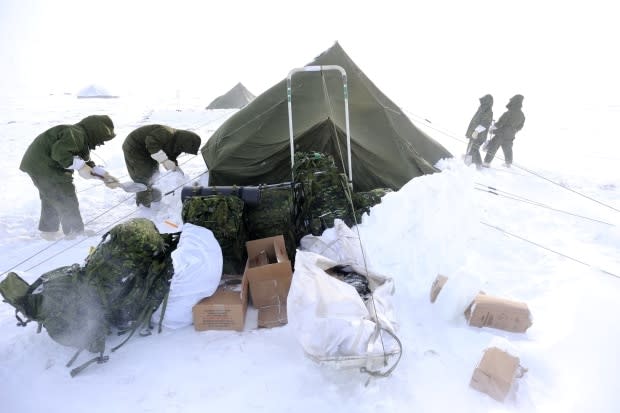Former military commanders offer ideas for keeping sane, healthy in COVID-19 lockdown

Are you climbing the walls yet?
Living and working in the same space with family in ever-present proximity — even with the occasional walk and blast of Netflix — is a shock to the system, especially when no one can tell you when it will be all over.
Submariners and soldiers know exactly how you feel and they've got a few ideas for keeping you sane and healthy over the long haul.
"I can relate to what families are going through," said former colonel Mark Gasperotto, a combat engineer who fought in Afghanistan.
The current conditions, in some respects, are not unlike troops confined to tents in the high Arctic in winter warfare exercises, or the teams of soldiers holed up in remote observations posts, he said.
"In a COVID environment when you're isolated in your home — sure you can go out for walks — you're really spending most of your time in close quarters with one another. So, that redefines the nature of the relationships; what people do to get along; what they do to work together. Everything takes on a much greater collective importance."
The importance of meal time
It is a similar — perhaps even more restricted experience — for submariners and even sailors in surface warships, said retired vice-admiral Bruce MacLean.
There are, MacLean was quick to add, absolute and obvious differences between a family stuck at home in isolation, riding out the coronavirus pandemic, and a warship crew on mission in some far-flung region of the globe.
"Home is — for most people — likely the safest haven you can have," he said.

The experiences collide, however, when it comes to the coping, team work, routine and even discipline that's needed to come out the other side.
MacLean, a former submariner, said there are "anchors" that get a ship's company through the day — and one of the most fundamental is meals.
"I remember when I was a commanding officer, the first person I would talk to when I went aboard was the senior cook and his team because the routine at sea when you're gone day in and day out absolutely revolves around meals," he said.
A good meal, shared together with a chance to talk, is important and healthy.
"It's cohesion, it's routine and it's structure," said MacLean. "On a warship, there's a job to do, there's a routine to do it and there's a structure in place on a 24/7 basis, whether it's cleaning or meals, maintenance or the operations."
Routine and responsibility
Making a daily plan of chores and activities and dividing the workload among family members is essential, said Gasperotto, who along with his wife, has two teenage daughters, both of whom are vested with the responsibility of motivating all of them to keep up with physical fitness and to stay in touch with other family members and friends.
"We have a routine and we're all responsible for our own portions of that."

Breakfast is usually followed by a quick huddle where they talk through issues and problems.
MacLean said dialogue is one of the most important lessons of his former life that is applicable to the circumstances of today.
"The lines of communication, whether it's within a house or a submarine are vital," said MacLean. "A sense of humour and a sense of keeping things at the right level is also very fundamental in a submarine environment."
It is also important, being in a confined space, that people consciously seek out a balance involving work, leisure, exercise, entertainment and crucially time to yourself, he said.
Taking precautions
That equilibrium must be deliberately and consciously sought out, said Gasperotto, who is also a big advocate of taking precautions whenever someone ventures outside of the home to the grocery store or another public venue where they can run into other people.
Upon returning home, members of his family run through a mild decontamination procedure, including hand washing and wiping things down, just to be safe.
Keeping the virus out of your home is of the utmost importance, Gasperotto said.

"These things should be done to a high degree of competence and a high degree of consistency There's a level of discipline required in everyday activities that typically isn't the case in normal times."
The hardest things for families in isolation, as it is for sailors confined to a ship, will be keeping perspective and not letting events in the outside world get to you, said MacLean.
"If you were to watch the news every day, continuously, I think the anxiety level can go up pretty dramatically," he said.
"So, how do you focus on the things you have to do on a day-to-day basis versus the stuff you don't have as much control over? It takes us back to routine and structure and having that daily plan."
Watch: Understanding the limits of COVID-19 models
Having said all that, both men recognize, unlike soldiers and sailors, most people simply can't just order their family around. There is no obligation to obey.
MacLean called that the "big caveat," which takes leadership, patience and a plea for teamwork.
"I relate back to when our twin daughters were growing up, I would have loved to run our family like a military unit or submarine and basically invoked the National Defence Act and Queens Regulations and Orders," MacLean said with a chuckle.
"The reality is it just doesn't work that way. In a family, you have to be so much more adaptable and so much more flexible."

